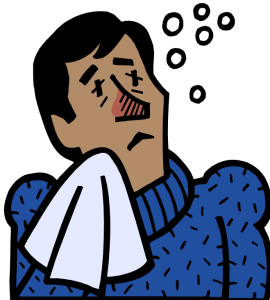Influenza is spreading rapidly in Snohomish County. Local health providers report a significant uptick in positive flu tests in the past two weeks, and many of the sick are people younger than 65. Seven local people died of the flu during last year’s flu season.
The predominant strain nationally so far is H1N1, the same kind of virus that sickened much of the nation in 2009. During the 2009 pandemic, younger adults and children, particularly people with chronic medical conditions and pregnant women, were harder hit by H1N1 compared with adults age 65 and older. The same pattern could emerge this year if H1N1 circulates widely.
The Centers for Disease Control and Prevention (CDC) report some severe illnesses, hospitalizations, and deaths from H1N1 to date in the 2013-2014 flu season. Three Washington state residents have died from flu so far this season (not in Snohomish County), and three have been hospitalized. These severe flu outcomes are a reminder that flu can be a very serious disease for anyone, including young, healthy adults. Visit www.flu.gov for more information about flu, and www.doh.wa.gov for statewide updates.
Flu activity in Snohomish County historically peaks in February or later. Last flu season, the deaths of seven people in Snohomish County were attributed to flu-related illness. In the United States, over a recent 30-year period, the CDC reports that the flu was linked to thousands of deaths each year — ranging from 3,000 to 49,000.
The vaccine for this current flu season is available at medical providers and pharmacies throughout the county and will protect against three or four kinds of influenza virus — including H1N1 — that make people sick.
Washing hands, covering your coughs, and staying home when you are sick are effective ways to reduce spreading and getting diseases. Vaccination is the best way to protect yourself and others.
Everyone 6 months and older should get a shot every year, since the flu vaccine changes to match the most common illnesses. Flu shots do not contain live virus — getting the flu from this vaccine is not possible.
The flu vaccine is strongly recommended for people who are
· 6 months old — up to their 19th birthday
· 50 years and older
· age 6 months and older with certain chronic health conditions
· pregnant and in any trimester
· living in long-term care facilities
· living with or caring for those at high risk for complications from the flu
· health care personnel
· household contacts and out-of-home caregivers of infants age 0-6 months (who are too young to receive vaccine)
The flu is a contagious respiratory illness caused by viruses that infect the nose, throat and lungs. People who have the flu often feel some or all of these signs and symptoms:
· Fever or feeling feverish/chills
· Cough
· Sore throat
· Runny or stuffy nose
· Muscle or body aches
· Headaches
· Extreme fatigue
Flu viruses spread when people with flu expel droplets from their mouths or noses while coughing, sneezing or talking. These droplets can land in the mouths or noses of people who are nearby. People can also get flu by touching a surface or object that has flu virus on it and then touching their own mouth, eyes or nose. A person can spread flu before they know they’re sick and up to seven days after. Children can spread it for even longer. Again, the best way to avoid getting or spreading the flu is to get a flu shot, and also washing hands, covering coughs and staying home if sick.
If an individual is already sick with the flu, buying valtrex online antiviral medications can lessen symptoms and help prevent serious complications. They work best when started quickly. It’s also important to stay away from others for at least 24 hours after a fever is gone without the use of fever-reducing medicine.
The Snohomish Health District’s clinics in Everett and Lynnwood are stocked full of vaccine to protect you against the flu. The cost for an adult flu shot at the Snohomish Health District is $30. A flu shot for a child costs $15. The Health District accepts payment by cash, check, VISA, MasterCard, Provider One (coupons), and Medicare for clients whose primary insurance is not with an HMO. Clients may apply for a reduced fee, based on income and household size.
Snohomish Health District clinic hours – shots by appointment only:
· SHD Everett Immunization Clinic, 3020 Rucker Ave, Suite 108, Everett, WA 98201
425.339.5220 for an appointment: 8 a.m.- 4 p.m., Mon-Wed-Fri; closed on weekends & holidays
· SHD Lynnwood Immunization Clinic, 6101 200th Ave SW, Lynnwood, WA 98036
425.775.3522 for an appointment: 8 a.m.- 4 p.m., Tue & Thu; closed on weekends & holidays
Established in 1959, the Snohomish Health District works for a safer and healthier Snohomish County through disease prevention, health promotion, and protection from environmental threats. Find more information about the Health Board and the Health District at http://www.snohd.org.
[ad#Google Adsense-2]





January 2, 2014
Everett